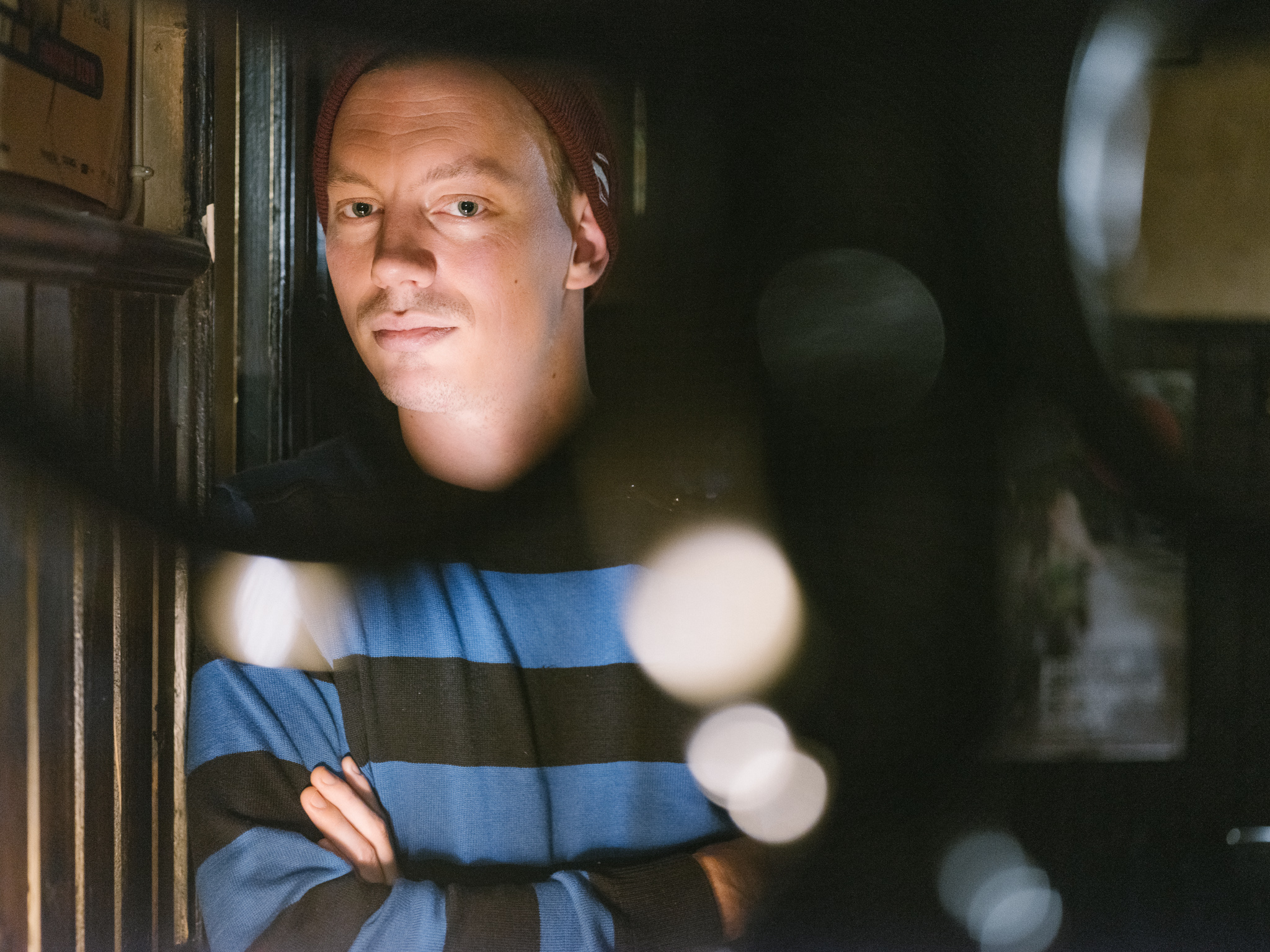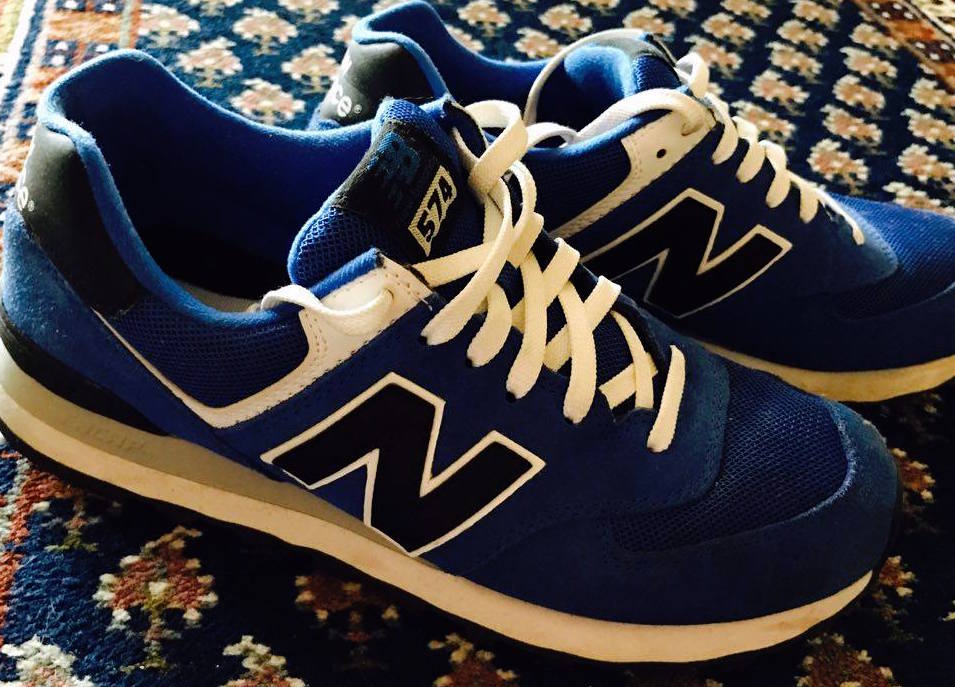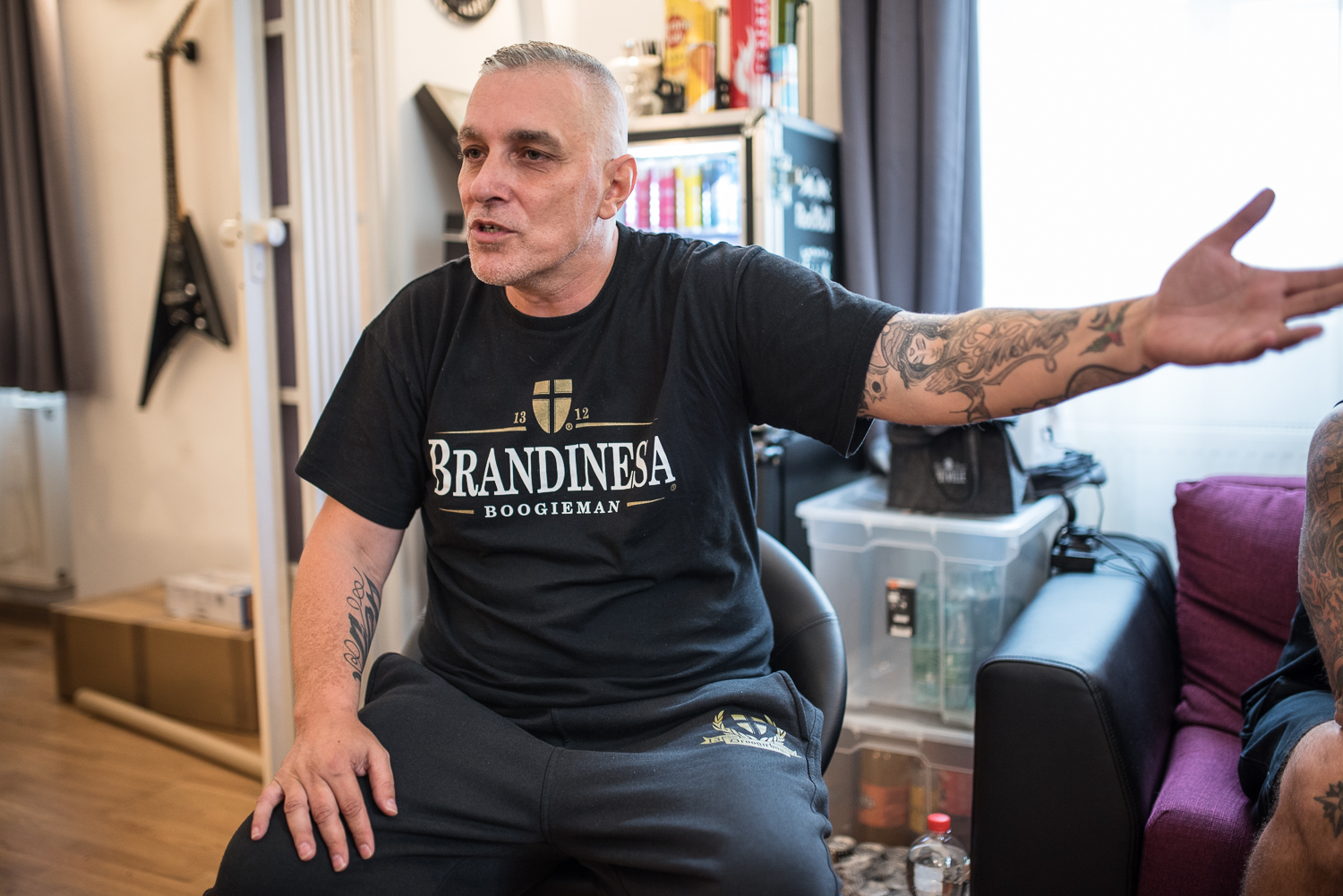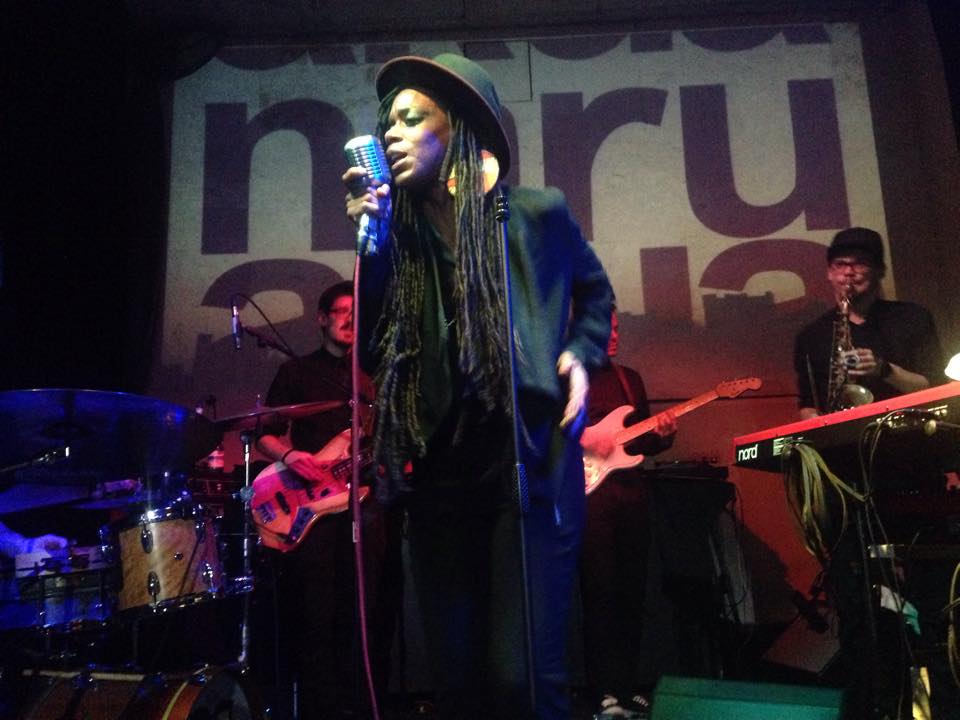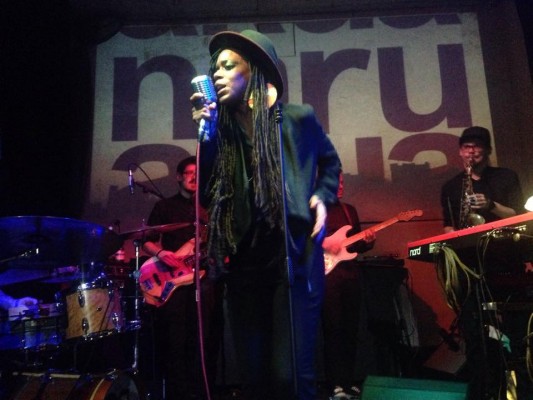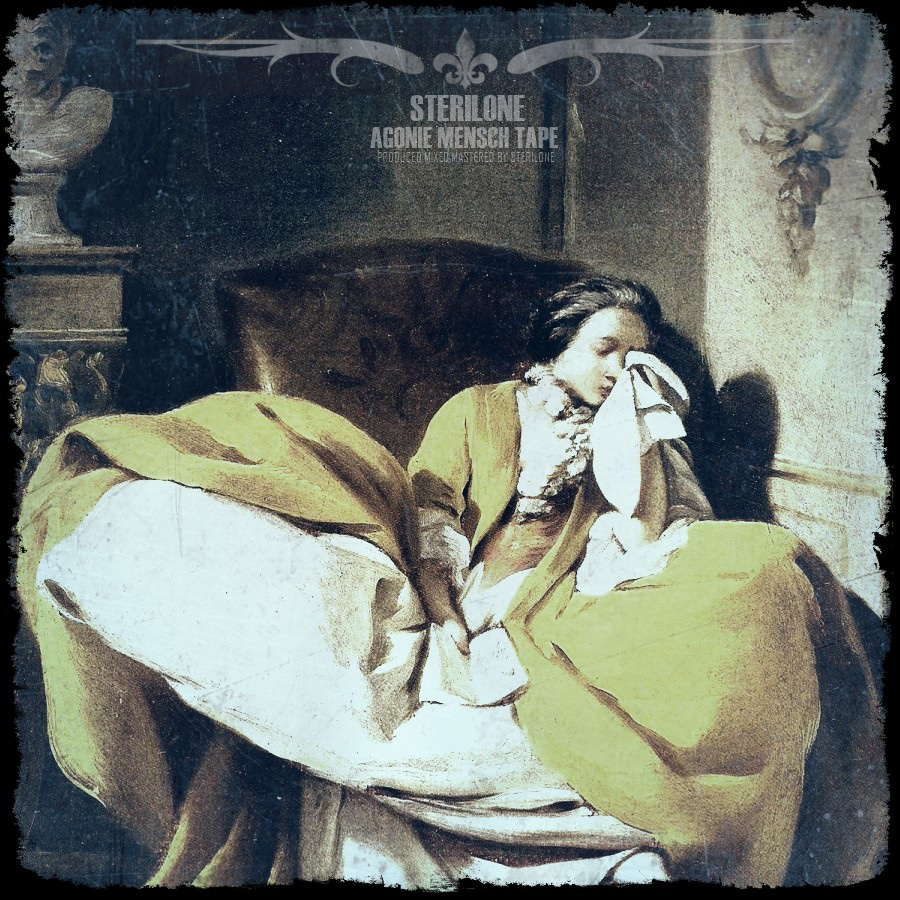Radio-Afficionado. Von Deutschrap über französischen & britischen Rap und natürlich…
Schon vor dem Öffnen der Tore zum Salon des Café Leopolds zieht sich eine Menschenschlange bis weit über die Stiegen des Cafés hinaus. Man wartet… Entweder, um sich die letzten, heiß begehrten Abendkassa-Tickets zu ergattern, oder um sich rechtzeitig einen guten Platz auf der Tanzfläche zu sichern. Unglaublich, wenn man bedenkt, dass Akua Naru vor zwei Jahren bei freiem Eintritt in derselben Location ihr erstes Album „The Journey Aflame“ präsentierte. Nun kommt sie mit ihrem zweitem Album, „The Miners Canary“ und der Digflo Band im Gepäck in das restlos ausverkaufte Café Leopold. Nach üblicher, vorfreudiger Warterei und einem gelungenen Instrumental Intro, betritt die Poetin unter tosendem Beifall die Bühne vor der rammelvollen Halle. Eine echte Live MC, die von der ersten Sekunde an hundert Prozent Motivation & Energie versprüht. Der Funke springt direkt auf die Crowd über: Es wird zusammen gejubelt, gesungen, getanzt und den poetischen Lines der Künstlerin gelauscht. Jeder Song wirkt wie ein weiterer Befreiungsschlag einer unterdrückten Frau. Auch sanftere Klänge, wie bei „Poetry/How does it feel“, schaffen eine ganz besondere Atmosphäre. „Real HipHop is over here!“ würde der Teacher wohl verlauten lassen. Die Messages sind klar: „Watch me“, „Lasst euch nicht unterkriegen“, „Ihr seid etwas Besonderes, egal wer das Gegenteil behauptet“ und „People Unite!“. Gänsehaut! Etwas weniger motiviert, dafür umso gesprächiger, trafen wir Akua Naru wenige Stunden vor ihrem Konzert in einem Nebenraum der Venue. Sie schien zwar sichtlich erschöpft von den Tourstrapazen, trotzdem entfachte sich ein interessantes Gespräch über Frauen im HipHop, die Missstände auf unserem Planeten und Battle-Rap.
Foto: Yasmin Yazdian
Interview: Clara Langer & Jérémie Machto
The Message: Your new album is called “The Miners Canary”. Could you explain the title?
Akua Naru: The Miners Canary refers to many things, but the title mainly came about through a series of conversations that I had with a friend of mine called Tricia Rose. The canary is the bird that makes the sacrifice to fly in the mine to test the gases at a certain level which could potentially kill the miners. So before they worked the miners would let the bird fly through the mine and if she survived through the mine than they could continue working. If she died, than they knew they had a few seconds to get out of the mine. So it’s an alert to danger or it’s a sign of hope.
How do you project that on to your music?
Well, this idea of the canary is a metaphor for many things. She is a metaphor for a lot of stories that I tell through the narrative, throughout this album and also for the position that I was in when I embarked upon this process of finishing this album, which lasted 2 years and was recorded with 53 people different people.
Do you see yourself as the canary that alerts the people?
I’m seeing myself as many things on a daily basis. And when I write my music I take different roles. So yes: I’m the canary but sometimes I’m working in the mine.
You talked about Tricia Rose. There is a speech at the end of “One Woman”. Is that her? How did you meet?
Yeah that’s her. I had an album that came out in 2011, called “The Journey Aflame” and I met her because there was a song on the album called “The Journey”. And I’ve always been a fan of her work. And I saw a speech that she had given that I was pretty impressed by. So I sampled her speech… illegally. I didn’t have her permission. But somehow we got in contact, because – I guess – someone sent her the CD and said: “Look this is you.”. So she got in contact with me and I thought she was going to confront me on illegally sampling her speech. But it was the beginning of what would later become a really great friendship. I wanted to have something like – in german you say “Roter Faden”, so that she appeared on the first album and also on the second. Also she is really really in, so it was just an honor to have her agree to do it. It was a phone conversation that we had and she was just recording her part. She sent it to me and I just put it on the record.
You also work together in an educational context.
Yes, we give lectures and workshops. We do conversations about HipHop, women in HipHop, things like that.
Talking about women in HipHop. Where is the difference between the messages transmitted by conscious rap like yours, opposed to mainstream HipHop, concerning that issue?
I don’t want to make a comparison. Each person is going to be influenced by the music or take from the music something different. It might be something that you find in a mainstream song, that might be something that you take from it, that might run in accord to something…I don’t know. In my music I just talk about my life and about lives of people that are close to me. I’m very interested in history. The music is very political so it’s a lot about how historical events shape the now. That’s a very important theme throughout my music and throughout my mission. In a lot of mainstream music today – and I don’t only talk about HipHop – you don’t always find a political message and obvious political focus. But I think a lot of artists probably are interested in politics and are concerned about what’s happening in the world but you know, when there is corporate interest there are these entities that have agendas and they kind of determine what is the main narrative. I don’t have that lens in my music because I pretty much control what I say and say what I want to say. That’s the beauty of independent music. So I’m not trying to go and making a comparison between some random mainstream artist and my music. I think that’s a waste of energy.
How do you think that the place of women in HipHop evolved since the 90s for example?
Well, I mean the question is how do you think that the position of women has evolved in the world?
So there is obviously a parallel?
Well, we live in the world… HipHop is a microcosmos. The question is: does patriarchy still exist? Does sexism exist? Absolutely, it’s an institution! It’s part of the socialization process. Are women free all around the world? The answer is no. So HipHop like Rock, like Country, like any genre, is going to be a reflection of that. Because the music, the art, reflects the world that we live in.
Is it important to you to condemn and to bring up these issues in your music?
I talk a lot about different things. The fact that I’m a woman is a part of my identity as a human being on this planet. The fact that I’m a black woman has everything to do with who I am as a person. It’s like, if you’re coming from Austria, the fact that you’re Austrian hasn’t anything to do with our relationship. That shaped who you are, that’s what makes you unique, that has an impact on who you are as a person. That comes out in my music, because that shaped my identity. So of course I address issues that are important to me as a woman. And some of this issues have to do with the fact that this world does not honor women like they should be honored. I address that in my music, among many things.
But do you see this as a fight that you have to take?
Well, I don’t want to see a fight. I just see it as the fact that there are issues that I discuss in my music. It’s definitely a struggle.
Even female rappers use misogynistic language in their records. How do you feel about that?
I think that sexism and patriarchy are institutions that socialize people. And we are the people. So I don’t feel that this conversation should be tailored towards HipHop. There are women who use sexist language in conversation. Period. Whether this is related to HipHop or not. Because that is how sexism works. It is perpetuated by people. Because of the institutions.
You don’t talk about your “lyrics” but your “politics”. How important is the poetic and musical aspect in the process of bringing your messages to the people?
It’s everything. If it wasn’t for the music this would be a different conversation. Music is very powerful, it’s a vibration and music can connect with people in ways that other forms can not. That’s why some people say: “Music is a weapon”. Because there are some songs that are so powerful, that might be in another language and you don’t really know exactly what the person is saying, but you feel the vibration. You feel the power of what they’re projecting out in the universe. And you probably feel the same thing that this person intended. If it was only on a page, it might not be able to compete.
We had an interview with Talib Kweli earlier this month. We talked about the reaction HipHop took to the Ferguson shooting. How did you witness the events and how important is it that HipHop artists especially, react to these kind of things?
It’s extremely important!
Did you also take action?
I went to a protest in my hometown, New Haven, Connecticut. But these tings are happening all over the world. It’s not limited to the United States. The terrorism that we face is global. I was in Brazil with an organization called “Racism Kills”, having conversations with political activists to figure out what can be done and also try to understand what is happening across the diaspora. Some people had revealed that they also had similar concerns about being targeted by the police. Especially in the Afro-Brazilian community.
It’s important to raise awareness through creating music that people can relate to using them as soundtracks of their movement. A lot of people are angry and enough is enough. So I think that the role of the artist as an activist is a very important one. Extremely important. I mean, look at people like Bob Marley for example, Nina Simone or Fela Kuti and how powerful they have been in influencing generations.
Since you’re on tour a lot are these injustices revealed more often to you? Are disparities getting more evident to you?
Absolutely! I’ve been traveling a lot in the last few years and the more you travel, the more your eyes are opened the more you see how unjust this world is. You understand what it really means when people say: “On a global scale”.
It helped me to be even more clear that my music has to be always about justice, has to always serve the people and has to always have a political focus.
Should music in general be political?
No. I mean, I don’t have any thoughts. I only can speak for my music. I got songs that are just about love, but some people say that love is political. Everything is politcal. You can find depth in everything. Every artist, every creator has the right to choose what it is that they create. I don’t think I have the right to limit anyone. So I can only speak for my music.
You shout out Roxanne Shanté in “The World is Listening”. She is considered as one of the first artists to make a battle rap record (Anm.: “Roxanne’s Revenge”, 1984). As a more poetic artist what do you think of battle rap?
I don’t want to get into comparison. I think there is a place for battle rap. As I said, everybody has the right to create art. I can listen to something just like you and say whether I like it or not. Just because you’re battling doesn’t take away from the fact that there are MCs who brought HipHop to a level of fine art. They battle you but they are painting images with their words. But in that moment, whether it’s a battle rap or something spiritual, political or poetic – doesn’t take away the fact that you can appreciate it as a profound work of art. For me, I just love art. I judge it by the message. If the message is just unjust for me as a human being, than I can not agree with it. It might really be dope, the beat might really be dope, but for me personally I can’t allow to rock to it. That’s just me. I have my own thoughts on it. But on another level: what is wrong with battle rap? You could battle somebody and slaughter this person lyrically and it could be dope. Roxanne Shanté… She used to battle everybody! Imagine the courage that she had, and she was a teenager at the time. So it was dope and it’s still dope. It’s classic.
Ähnliche Posts
- "You have to challenge the society" // Jahson The Scientist Interview
Jahson The Scientist ist ein "Wordsman", der in seinen Ausdrucksformen keine Grenzen kennt. Er ist…
- The Story of a Long Lost Relative // DJ Werd Interview
DJ Werd ist seit Jahren eine Art "graue Eminenz" im deutschen HipHop-Geschehen. Aufgewachsen in San Jose,…
- "We gotta fuck the system up" // Mick Jenkins Interview
Kurz vor seinem Wien-Auftritt in der Grellen Forelle nimmt sich Mick Jenkins, der bei seiner…
Radio-Afficionado. Von Deutschrap über französischen & britischen Rap und natürlich Österrap. Außerdem Battle-Rap-Fanatiker und beherrscht die Beistrichregeln, nicht, besonders, gut.



